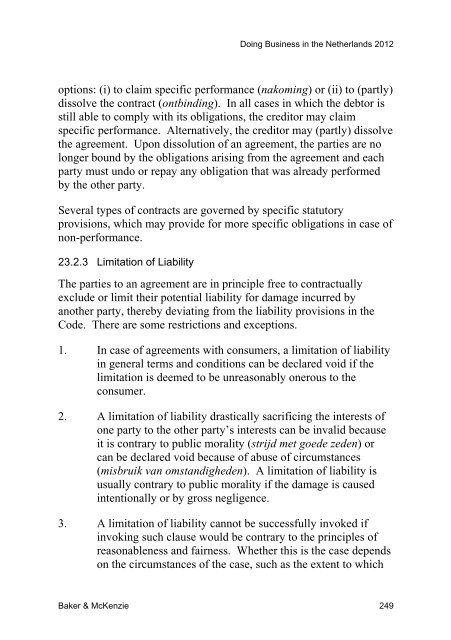- Page 1 and 2:
Doing Business in the Netherlands 2
- Page 3 and 4:
Editorial Contributions Robert van
- Page 5 and 6:
Doing Business in the Netherlands 2
- Page 7 and 8:
Doing Business in the Netherlands 2
- Page 9 and 10:
Doing Business in the Netherlands 2
- Page 11 and 12:
Doing Business in the Netherlands 2
- Page 13 and 14:
Doing Business in the Netherlands 2
- Page 15 and 16:
Doing Business in the Netherlands 2
- Page 17 and 18:
Doing Business in the Netherlands 2
- Page 19 and 20:
Innovative ways to inform you Doing
- Page 21 and 22:
1 The Netherlands Doing Business in
- Page 23 and 24:
Doing Business in the Netherlands 2
- Page 25 and 26:
Doing Business in the Netherlands 2
- Page 27 and 28:
Doing Business in the Netherlands 2
- Page 29 and 30:
Doing Business in the Netherlands 2
- Page 31 and 32:
Steady-Course Policy Doing Business
- Page 33 and 34:
Doing Business in the Netherlands 2
- Page 35 and 36:
Doing Business in the Netherlands 2
- Page 37 and 38:
2 Legal Forms of Doing Business Doi
- Page 39 and 40:
2.3 Branch versus Subsidiary Doing
- Page 41 and 42:
Doing Business in the Netherlands 2
- Page 43 and 44:
Doing Business in the Netherlands 2
- Page 45 and 46:
Doing Business in the Netherlands 2
- Page 47 and 48:
Doing Business in the Netherlands 2
- Page 49 and 50:
Doing Business in the Netherlands 2
- Page 51 and 52:
4 The Subsidiary 4.1 Incorporation
- Page 53 and 54:
Doing Business in the Netherlands 2
- Page 55 and 56:
Doing Business in the Netherlands 2
- Page 57 and 58:
Doing Business in the Netherlands 2
- Page 59 and 60:
Doing Business in the Netherlands 2
- Page 61 and 62:
Doing Business in the Netherlands 2
- Page 63 and 64:
Doing Business in the Netherlands 2
- Page 65 and 66:
Doing Business in the Netherlands 2
- Page 67 and 68:
Doing Business in the Netherlands 2
- Page 69 and 70:
Doing Business in the Netherlands 2
- Page 71 and 72:
Doing Business in the Netherlands 2
- Page 73 and 74:
Doing Business in the Netherlands 2
- Page 75 and 76:
Doing Business in the Netherlands 2
- Page 77 and 78:
8 Commercial Contracts 8.1 General
- Page 79 and 80:
Doing Business in the Netherlands 2
- Page 81 and 82:
Doing Business in the Netherlands 2
- Page 83 and 84:
9 Real Estate 9.1 Ownership Doing B
- Page 85 and 86:
Doing Business in the Netherlands 2
- Page 87 and 88:
Doing Business in the Netherlands 2
- Page 89 and 90:
9.7 Leases Doing Business in the Ne
- Page 91 and 92:
Doing Business in the Netherlands 2
- Page 93 and 94:
Doing Business in the Netherlands 2
- Page 95 and 96:
Doing Business in the Netherlands 2
- Page 97 and 98:
Doing Business in the Netherlands 2
- Page 99 and 100:
Doing Business in the Netherlands 2
- Page 101 and 102:
10.5 The European Economic Area Doi
- Page 103 and 104:
Doing Business in the Netherlands 2
- Page 105 and 106:
Doing Business in the Netherlands 2
- Page 107 and 108:
Doing Business in the Netherlands 2
- Page 109 and 110:
Doing Business in the Netherlands 2
- Page 111 and 112:
Doing Business in the Netherlands 2
- Page 113 and 114:
Doing Business in the Netherlands 2
- Page 115 and 116:
Doing Business in the Netherlands 2
- Page 117 and 118:
12 Telecommunications 12.1 Market S
- Page 119 and 120:
Doing Business in the Netherlands 2
- Page 121 and 122:
Doing Business in the Netherlands 2
- Page 123 and 124:
12.9 Net Neutrality Doing Business
- Page 125 and 126:
Doing Business in the Netherlands 2
- Page 127 and 128:
Doing Business in the Netherlands 2
- Page 129 and 130:
Doing Business in the Netherlands 2
- Page 131 and 132:
Doing Business in the Netherlands 2
- Page 133 and 134:
14 Labor Law 14.1 Term Doing Busine
- Page 135 and 136:
Doing Business in the Netherlands 2
- Page 137 and 138:
Doing Business in the Netherlands 2
- Page 139 and 140:
Doing Business in the Netherlands 2
- Page 141 and 142:
Doing Business in the Netherlands 2
- Page 143 and 144:
14.4 Works Council Doing Business i
- Page 145 and 146:
Doing Business in the Netherlands 2
- Page 147 and 148:
Doing Business in the Netherlands 2
- Page 149 and 150:
Doing Business in the Netherlands 2
- Page 151 and 152:
Doing Business in the Netherlands 2
- Page 153 and 154:
Doing Business in the Netherlands 2
- Page 155 and 156:
Doing Business in the Netherlands 2
- Page 157 and 158:
Doing Business in the Netherlands 2
- Page 159 and 160:
Doing Business in the Netherlands 2
- Page 161 and 162:
Doing Business in the Netherlands 2
- Page 163 and 164:
Doing Business in the Netherlands 2
- Page 165 and 166:
Doing Business in the Netherlands 2
- Page 167 and 168:
Doing Business in the Netherlands 2
- Page 169 and 170:
17.5 Income Tax Ruling Doing Busine
- Page 171 and 172:
17.5.3 Status of the Employer Doing
- Page 173 and 174:
Doing Business in the Netherlands 2
- Page 175 and 176:
Doing Business in the Netherlands 2
- Page 177 and 178:
Doing Business in the Netherlands 2
- Page 179 and 180:
Doing Business in the Netherlands 2
- Page 181 and 182:
18.1.7 Non-Resident Shareholder Tax
- Page 183 and 184:
18.2.4 Method of Taxation and Tax R
- Page 185 and 186:
Doing Business in the Netherlands 2
- Page 187 and 188:
Doing Business in the Netherlands 2
- Page 189 and 190:
Doing Business in the Netherlands 2
- Page 191 and 192:
18.6 Limitations on Deductions of I
- Page 193 and 194:
Doing Business in the Netherlands 2
- Page 195 and 196:
Doing Business in the Netherlands 2
- Page 197 and 198:
Doing Business in the Netherlands 2
- Page 199 and 200:
18.9 Tax Incentives Doing Business
- Page 201 and 202:
Doing Business in the Netherlands 2
- Page 203 and 204:
Doing Business in the Netherlands 2
- Page 205 and 206:
Doing Business in the Netherlands 2
- Page 207 and 208:
Doing Business in the Netherlands 2
- Page 209 and 210:
Doing Business in the Netherlands 2
- Page 211 and 212: Doing Business in the Netherlands 2
- Page 213 and 214: Doing Business in the Netherlands 2
- Page 215 and 216: Doing Business in the Netherlands 2
- Page 217 and 218: Doing Business in the Netherlands 2
- Page 219 and 220: Doing Business in the Netherlands 2
- Page 221 and 222: Doing Business in the Netherlands 2
- Page 223 and 224: Doing Business in the Netherlands 2
- Page 225 and 226: Doing Business in the Netherlands 2
- Page 227 and 228: 19.1.6 Rates Doing Business in the
- Page 229 and 230: 19.3 Dividend Withholding Tax Doing
- Page 231 and 232: Doing Business in the Netherlands 2
- Page 233 and 234: Doing Business in the Netherlands 2
- Page 235 and 236: Doing Business in the Netherlands 2
- Page 237 and 238: Doing Business in the Netherlands 2
- Page 239 and 240: 21 Investment Incentives Doing Busi
- Page 241 and 242: Doing Business in the Netherlands 2
- Page 243 and 244: Doing Business in the Netherlands 2
- Page 245 and 246: Doing Business in the Netherlands 2
- Page 247 and 248: 22 Financial Regulations 22.1 Excha
- Page 249 and 250: Doing Business in the Netherlands 2
- Page 251 and 252: Doing Business in the Netherlands 2
- Page 253 and 254: Doing Business in the Netherlands 2
- Page 255 and 256: Doing Business in the Netherlands 2
- Page 257 and 258: Doing Business in the Netherlands 2
- Page 259 and 260: 22.2.8 Other Regulated Activities D
- Page 261: Doing Business in the Netherlands 2
- Page 265 and 266: 23.3.3 Product Liability Doing Busi
- Page 267 and 268: Doing Business in the Netherlands 2
- Page 269 and 270: Doing Business in the Netherlands 2
- Page 271 and 272: Doing Business in the Netherlands 2
- Page 273 and 274: Doing Business in the Netherlands 2
- Page 275 and 276: Doing Business in the Netherlands 2
- Page 277 and 278: Doing Business in the Netherlands 2
- Page 279 and 280: 24.13 Arbitration Doing Business in
- Page 281 and 282: Doing Business in the Netherlands 2
- Page 283 and 284: Doing Business in the Netherlands 2
- Page 285 and 286: Doing Business in the Netherlands 2
- Page 287 and 288: Tax Corporate & International Tax H
- Page 289: www.bakermckenzie.nl Baker & McKenz





![912.025 AmCham News [1] - American Chamber of Commerce in ...](https://img.yumpu.com/9328612/1/190x127/912025-amcham-news-1-american-chamber-of-commerce-in-.jpg?quality=85)

